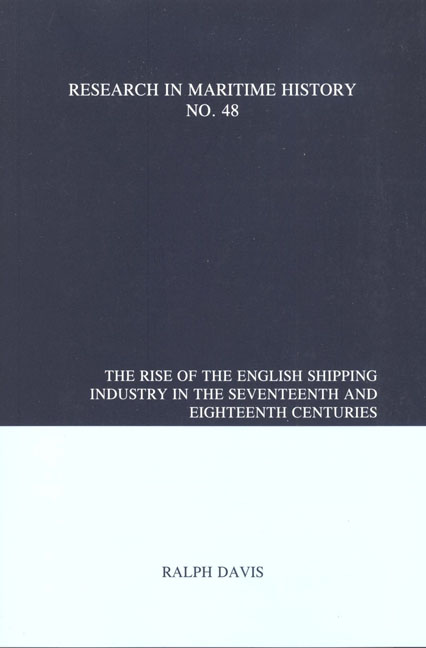Book contents
- Frontmatter
- Contents
- Introduction to the 2012 Edition
- Series Editor's Note
- Introduction
- Preface
- Chapter 1 The Widening of Horizons, 1560-1689
- Chapter 2 Consolidation, 1689-1775
- Chapter 3 Ships and Shipbuilders in the Seventeenth Century
- Chapter 4 Ships and Shipbuilders in the Eighteenth Century
- Chapter 5 The Shipowners
- Chapter 6 The Merchant Seamen
- Chapter 7 The Pay and Conditions of Merchant Seamen
- Chapter 8 Shipping Management and the Role of the Master
- Chapter 9 Shipping and Trade
- Chapter 10 The Nearby and Northern European Trades
- Chapter 11 The Southern European and Mediterranean Trades
- Chapter 12 The East Indian Trade
- Chapter 13 The American and West Indian Trades
- Chapter 14 The Government and the Shipping Industry
- Chapter 15 War and the Shipping Industry
- Chapter 16 Four Ships and Their Fortunes
- Chapter 17 Was It a Profitable Business?
- Chapter 18 Conclusion
- Appendix A A Note on the Shipping Statistics, 1686-1788
- Appendix B Sources for the History of the Shipping Industry
- Index
Appendix B - Sources for the History of the Shipping Industry
- Frontmatter
- Contents
- Introduction to the 2012 Edition
- Series Editor's Note
- Introduction
- Preface
- Chapter 1 The Widening of Horizons, 1560-1689
- Chapter 2 Consolidation, 1689-1775
- Chapter 3 Ships and Shipbuilders in the Seventeenth Century
- Chapter 4 Ships and Shipbuilders in the Eighteenth Century
- Chapter 5 The Shipowners
- Chapter 6 The Merchant Seamen
- Chapter 7 The Pay and Conditions of Merchant Seamen
- Chapter 8 Shipping Management and the Role of the Master
- Chapter 9 Shipping and Trade
- Chapter 10 The Nearby and Northern European Trades
- Chapter 11 The Southern European and Mediterranean Trades
- Chapter 12 The East Indian Trade
- Chapter 13 The American and West Indian Trades
- Chapter 14 The Government and the Shipping Industry
- Chapter 15 War and the Shipping Industry
- Chapter 16 Four Ships and Their Fortunes
- Chapter 17 Was It a Profitable Business?
- Chapter 18 Conclusion
- Appendix A A Note on the Shipping Statistics, 1686-1788
- Appendix B Sources for the History of the Shipping Industry
- Index
Summary
Scores of millions of words have been written about English ships and shipping; but serious attempts to account for the growth of the shipping industry and to explain its organization are very few, and relate almost entirely to the nineteenth and twentieth centuries. C.E. Fayle's excellent little book A Short History of the World's Shipping Industry (London, 1933) covers, as its title suggests, all time and all space; its discussion of the English, or indeed the European, industry in our period is very brief, though it packs a great deal of valuable information into its short space. W.S. Lindsay's History of Merchant Shipping and Ancient Commerce (4 vols., London, 1874-1875) is very useful for the period of Lindsay's personal recollections, the first sixty years or so of the nineteenth century, but the earlier volumes are a valueless hotchpotch of largely inaccurate information about explorers and privateers. L.A. Harper's The English Navigation Laws (New York, 1939) incorporates a long and useful study of the industry the laws were made to protect. Beyond these three works, there is nothing that offers very substantial help. Nor is the industry seriously discussed by writers on trade, or even by the nautical archaeologists. The former, with a handful of exceptions, avoid shipping topics; the latter confine themselves to warships and East Indiamen. Much information about shipping can be picked up incidentally from these works, but they give no general guidance. The seventeenth century saw much discussion of the English and Dutch shipping industries, and there is a good deal to be learned from this largely propagandist literature, which died away soon after 1700. A number of seamen throughout the period wrote of their experiences, in diaries or in later memoirs which have since been published. Books in all these categories have been consulted, and this work owes much to them; they are referred to in the footnotes to the main text. It would be impossible, however, to build any history of the shipping industry on such sources, and there seems little point in producing a bibliography which, extending to many pages, would hardly touch on the sources upon which this book depends.
- Type
- Chapter
- Information
- The Rise of the English Shipping Industry in the Seventeenth and Eighteenth Centuries , pp. 391 - 396Publisher: Liverpool University PressPrint publication year: 2012



